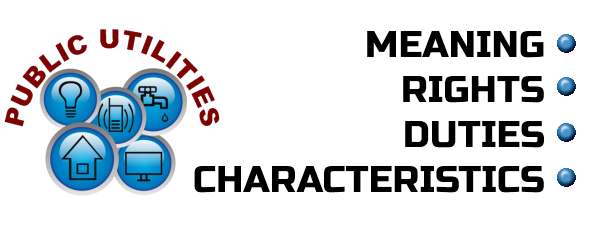Public Utility | Meaning | Characteristics | Rights | Duties
Table of Contents
Introduction to Public Utilities
Public enterprises produce goods and services which are indispensable for human life. Water supply and sewerage boards, electricity boards, transport, gas companies etc., are run as public utilities. They comprise of all industries which are run with public welfare as the primary objective.

They are organized as monopolies under the control of the government. Reasonable prices are charged from the public. The idea is that everyone should be able to buy and consume these services.
Characteristics of Public Utilities
The following are the characteristics of public utilities:
1. Supply of essential goods and services
Public utilities produce and supply goods and services which are indispensable for human life. Society would be put to severe hardship if these services are not made available. Public utilities provide goods and services which are essential for human life. They provide goods and services relating to water supply and sewerage, electricity, transport, gas supply etc.
2. Local in character
Public enterprises are local in character. They operate in specified local areas. Each particular locality would have a public utility serving its needs.
3. Organized as monopolies
Public utilities provide essential goods and services to the common man. They operate with a service motive keeping in mind the primary objective of social welfare. If competition is allowed it may lead to unfair practices and wastage of resources in marketing. Therefore public utilities are organized as monopolies under government control.
4. Strict regulation
Public utilities are organized as monopolies under government control. They provide essential goods and services to satisfy the essential needs of the consuming public. Any deficiency in service would lead to serious social problems.
For e.g. if the water supplied is contaminated, it may lead to diseases or even an epidemic, if power supply is erratic it may lead to stoppage of production in industries, if there is leakage in gas cylinders supplied, it may lead to loss of human life.
Considering this aspect, public utilities are regulated strictly with regard to their quality, prices charged, services provided etc.
5. Large investment
Public utilities require huge capital outlay. Setting up a public utility calls for heavy capital investment. Investment cannot be made in stages. The entire amount of funds needs to be invested, before a public utility can commence its operations.
6. Inelastic demand
The demand for goods and services provided by public utilities is inelastic in nature. They provide essential goods and services which are required by every member of the society. Any disruption in production would lead to shortages and severe problems. Considering the fact that demand is inelastic and if left to the private sector there is possibility of large scale exploitation, the government undertakes the responsibility of running public utilities.
7. Non-transferability of demand
A consumer of a public utility cannot transfer his demand to any another. It is because, public utilities operate as monopolies, and therefore transfer of demand is not possible.
For e.g. if any consumer of electricity in Tamil Nadu is dissatisfied with the service provided by TNEB (TamilNadu Electricity Board) he does not have the option of switching over to any other service provider. It is because TNEB enjoys monopoly rights for generating and distributing electricity to the public of Tamil Nadu. The consumer can have a choice only if he moves to some other State.
8. Lower risk
There is significantly lower risk in operating public utilities. There is no competition as they are organized as monopolies. There is no fear of change in consumer tastes and preferences as they supply goods and services indispensable for human life. The demand is also constant and inelastic in nature. So there is no question of the organization saddled with unsold stock etc.
9. Economies of scale
Most of the public utilities operate on a large scale. It is because they have to cater to the requirements of a large segment of the population. By operating on a large scale, they are able to reap the benefits of economies of scale. They are able to spread their fixed costs over more number of units and consequently enjoy low costs.
10. Government franchise
Franchise can be said to be a contract between the public utility and the government company. The franchise is given for a specified period of time. The franchise permits the public utility to use public places such as roads and government building to lay cables, run wires etc.,
Rights of Public Utilities
The following are the rights of public utilities:
1. Right to charge reasonable prices for services provided. The price can be set to cover operating expenses and earn a fair return on investment.
2. It can use public places, streets and buildings for fixing appliances.
3. Right to charge different prices from different buyers based on their price elasticity.
Duties of Public Utilities
The following are the duties of public utilities:
1. Duty to provide services to all consumers without any discrimination.
2. Duty to use the full capacity to provide services to all consumers requiring the product or service produced by the public utility.
3. Duty to provide safe and adequate service in a timely manner.
4. To follow just pricing practices and not to overcharge consumers.
5. Not to indulge in highly discriminatory pricing practices.


